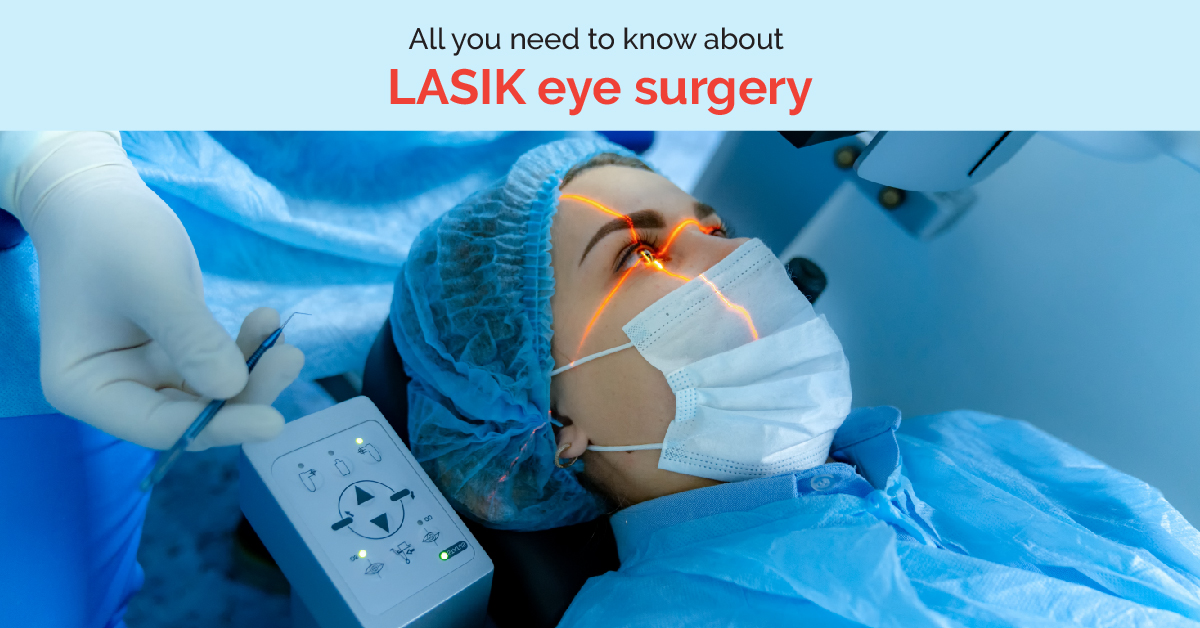Allergy
Blood Diseases
Bone & Joints
Brain
Cancer
Child Care
Cosmetic Surgery
Diabetes
Endocrinology
ENT
Eye
Gen Medicine
General Surgery
Heart
Kidney
Lifestyle
Liver & Digestive
Lung
Men’s Health
Mental health
Physiotherapy
Rheumatology
Skin and hair
Sleep Disorders
Spine
Transplant
Women Health
Thyroid
Vascular Surgery
All you need to know about Lasik eye surgery

Description
LASIK eye surgery is a surgical procedure performed to correct vision problems. It is an alternative to glasses and contact lenses. In this procedure, a laser beam is used to reshape the cornea and correct visual acuity.
Indications
LASIK eye surgery is performed to correct several vision problems which include the following.
- Nearsightedness (Myopia): Inability to see far objects
- Farsightedness (Hyperopia): Inability to see close objects
- Astigmatism: Improper shape of the lens, causing blurry vision
Contraindications and Risk Factors
Conditions at which LASIK eye surgery is not performed include:
- Children under 18 years of age
- Unstable refractive error or a refractive error beyond the range of laser correction
- Active collagen vascular disease
- Presence of pacemaker
- Ongoing inflammation of eyes such as conjunctivitis, blepharitis, or dry eyes
- Pregnancy
- Thin corneas or presence of keratoconus disorder
- Large pupils that increase the risk of visual disturbances
- Autoimmune disorders such as rheumatoid arthritis or lupus
- Frequent participation in contact sports such as boxing or wrestling
- A weakened immune system
- Presence of eye injuries or other eye disorders like uveitis, herpes simplex infection of the eyes, glaucoma, or cataracts
Investigations before the procedure
Tests that are performed before doing LASIK eye surgery are:
- Comprehensive vision analysis which involves tests to evaluate the complete health of eyes and vision
- Corneal topography to determine the power and shape of the cornea
- Binocular vision assessment to evaluate eye focusing and tracking visual perception, and processing speed
- Wavefront analysis to measure the optical properties of the eye and to detect optical irregularities
- Qualitative and quantitative tear film tests to determine the quality and quantity of tears
- Examination to measure the composition, shape, and thickness of the cornea
- Tests to measure the accurate size of the pupil
- Tests to determine intraocular pressure
- Slit-lamp examination to visualize structures at the front of the eye and inside the eye
- Dilated fundus examination to obtain a better view of the fundus of the eye
Preoperative Advice
Preoperatively before performing LASIK eye surgery:
- All the risks, benefits, and alternatives of the procedure are discussed
- Wearing of contact lenses is discontinued 5to 21 days before surgery
- Eye makeup should be avoided before surgery
Intraoperative Details
Anesthesia: LASIK eye surgery is performed under topical anesthesia.
Duration: LASIK eye surgery is usually completed within 30 minutes or even less.
Description of the procedure: After the administration of anesthesia, an instrument is used to hold the eyelids open. A soft corneal suction ring is placed on the eye to hold the eye in place. This may result in some bleeding, which would resolve gradually. A small blade or cutting laser is used to cut a hinged flap in the cornea. The flap is held back revealing the middle part of the cornea. A laser is used to reshape the cornea. The laser beam removes a tiny amount of corneal tissue to obtain the appropriate shape. After reshaping the cornea, the flap is placed back into position. The treatment area is checked for the presence of any air bubbles or debris. The position of the flap is checked once again. The flap does not require any sutures and it heals on its own. LASIK eye surgery can be performed on both eyes on the same day.
Postoperative Details
Postoperatively after LASIK eye surgery:
- Eye drops are given for pain and discomfort
- The individual may experience itching, burning, and gritty sensation in the operated eye
- The vision is restored immediately after the surgery
- The eye protection shield is placed to protect the eye until it heals completely
- The healing of the eye can take approximately 2 to 3 months
- Follow-up is scheduled by the physician to monitor healing progress and identify any complications
Non-Medical -Role of Diet/Exercise/Lifestyle Changes
Aftercare instructions for LASIK eye surgery are:
- Avoid strenuous workouts during the first week after the surgery
- Avoid rubbing the eyes for one week after the surgery
- Avoid dirty environments for the first week after the surgery
- Avoid swimming in pools or hot tubs for the first four weeks after the surgery
- Avoid eye makeup for one week after the surgery
- Wear sunglasses
- Avoid sports activities
- Avoid getting in contact with contaminated water
- Take adequate rest
Complications
Some of the complications that are associated with LASIK eye surgery include:
- Dry eyes
- Infection
- Flap complications
- Halos
- Corneal scarring
- Red spots of blood on the conjunctiva (white part of the eye)
- Eye floaters
- Blurry vision for a few days
Prognosis
The overall prognosis of LASIK eye surgery is excellent. It is a very effective treatment in improving vision and reducing the use of glasses or contact lenses.
Was this article helpful?
YesNo




